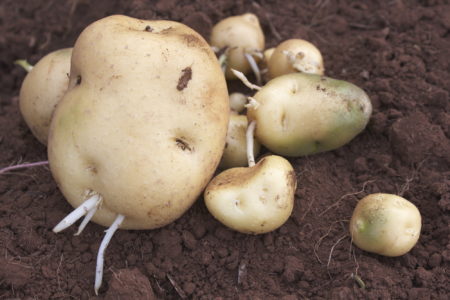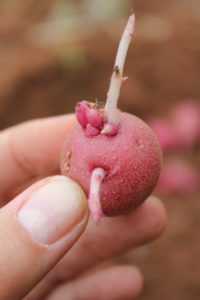 Although it might seem surprising, many Kenyan farmers, entrepreneurs, and investors are intensely interested in the preparation of new regulations on the production and marketing of planting materials for vegetatively propagated crops (VPCs), such as potato and sweetpotato. The new regulations may determine who can and cannot produce VPC planting material, how quickly yields and output might grow, and what varieties come to dominate the market in the coming years.
Although it might seem surprising, many Kenyan farmers, entrepreneurs, and investors are intensely interested in the preparation of new regulations on the production and marketing of planting materials for vegetatively propagated crops (VPCs), such as potato and sweetpotato. The new regulations may determine who can and cannot produce VPC planting material, how quickly yields and output might grow, and what varieties come to dominate the market in the coming years.
At present, seed potato and sweetpotato vines—the propagation materials that farmers use each season to plant a new crop—are produced, stored, and traded by farmers in a largely unregulated manner. Exchanges are mainly local because these planting materials do not travel well, and because only a few privately-owned farms and a handful of state-owned seed enterprises and development projects produce certified planting material. As a result, just 4-5 percent of seed potato planted in Kenya is certified, although this is now on the rise with significant investments by the private sector over the last couple of years. For sweetpotato, the proportion of certified seed is much less.
However, the Government of Kenya is anticipating that by regulating the production and trade in VPC planting material, farmers will gain access to better seed—materials free from pests and diseases that can damage the crop, and materials that contain traits that are appropriate to their farming system and to market demand. This is expected to lead to increased production, higher yields, and greater value for farmers, food processors, and other value chain actors. Access to seed produced under a better quality assurance system is particularly important in the case of potatoes, where bacterial wilt and potato cyst nematode can cause serious damage to the crop.

Following amendments to the country’s seed sector policy in 2016, the Government has assigned its regulator, the Kenya Plant Health inspectorate Service (KEPHIS), to the task. This may be the first instance in Sub-Saharan Africa of detailed regulations being introduced specifically for VPC planting materials. (While seed standards for VPCs are in place in many countries, seed regulations are general stipulations applied to all crops and are typically based on the characteristics of seed for grain crops, not VPCs.)
As it stands now—under a strict interpretation of the current seed law—selling seed which has not been certified seed is illegal. But the situation on the ground is quite different: the informal market and farmer-to-farmer exchanges of seed are likely to play an important role for many VPCs in Kenya for the foreseeable future.
Still, KEPHIS is charged with formulating the precise requirements to produce VPC planting material, including registration procedures and fees necessary for a farmer group, cooperative, or enterprise to become a seed producer, sampling procedures, crop-specific parameters and tolerance levels for pests and diseases, and the number and type of inspections needed to secure certification for a seed lot before it is sold on the market.
Will these regulations accelerate yield and output growth by encouraging large-scale investment in the sector? Or will they pose barriers to entry for those looking to invest in the VPC seed business? And will smallholder farmers—especially women smallholders who often play a central role in VPC crop management and seed production—have a voice in the process that ultimately leads to these new regulations?
These are the questions facing a team of researchers from the International Potato Center (CIP) and the International Food Policy Research Institute (IFPRI) as part of a study supported by the CGIAR research programs on Roots, Tubers, and Bananas (RTB) and on Policies, Institutions, and Markets (PIM), and by the CGIAR Collaborative Platform for Gender Research.
“Read the full story on the RTB Blog”
